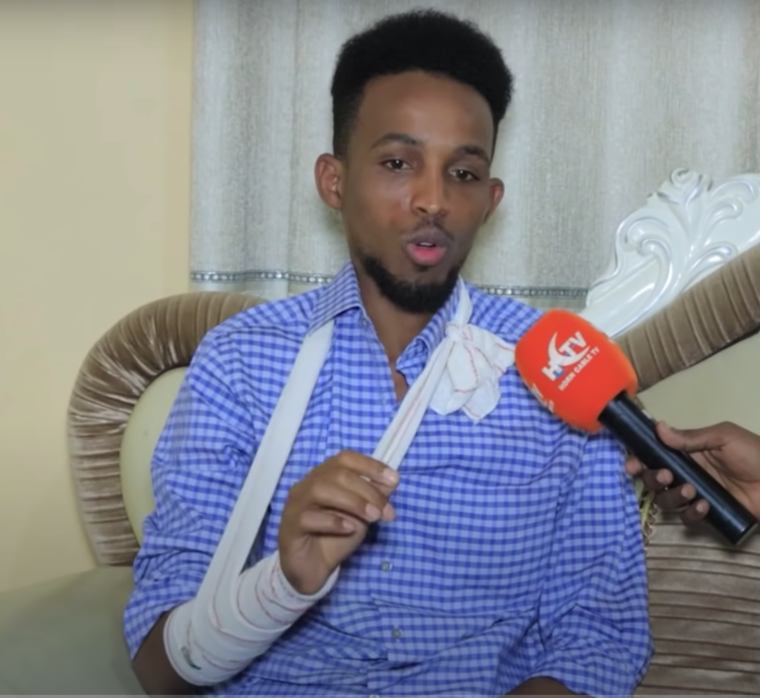Nairobi, April 11, 2022 — Authorities in the breakaway region of Somaliland should unconditionally release freelance online journalist Abdisalan Ahmed Awad and hold the intelligence officers who harassed and assaulted him and two other journalists responsible, the Committee to Protect Journalists said Monday.
On the night of March 18, Abdisalan was riding in a car with freelance journalist Ali Mahdi Jibril and privately owned Saab TV reporter Shafic Mohamed Ibrahim in the capital, Hargeisa, when five men allegedly dragged them out of the car and beat Abdisalan and Ali, according to Ali, who spoke with CPJ via messaging app; media reports that quoted Abdisalan and Shafic; and separate statements by the Human Rights Center (HRC), an advocacy group, as well as the Somaliland Journalists Association and the Somali Journalists Syndicate, two press rights organization. Ali said that he and Abdisalan recognized the men as intelligence officers; the HRC statement said the attackers were members of the Somaliland Intelligence Agency. The men fired several shots during the attack, Ali and Shafic said.
The men focused their assault on Abdisalan, who they accused of writing critically about Somaliland President Muse Bihi Abdi on Facebook, warning the journalist to “leave our president alone,” according to Ali; Shafic, who also spoke to CPJ via messaging app; and the media reports.
Ali told CPJ that on the evening of April 3, intelligence officers in Hargeisa arrested Abdisalan shortly after he broke his fast for Ramadan at a local restaurant. Ali told CPJ he learned of the April 3 arrest after speaking to an eyewitness. Abdisalan remained detained at an undisclosed location, according to Ali and an April 9 joint statement from the Somali Journalists Syndicate and the Somali Media Association, both based in Mogadishu, which cited an unnamed local human rights defender. Abdisalan is believed to have been detained in retaliation for speaking out about the March 18 attack, according to these same sources and another journalist familiar with the case, who spoke to CPJ on condition of anonymity for fear of retaliation. CPJ was not able to independently verify the details of Abdisalan’s April 3 arrest at the restaurant, or his current whereabouts in detention.
“It is shocking that security agents in Hargeisa are shooting at and beating up journalists whose Facebook posts they do not like. Authorities should be spending their time investigating this attack, and ensuring justice, rather than throwing a journalist behind bars,” said CPJ sub-Saharan Africa representative Muthoki Mumo. “Authorities in Somaliland should unconditionally release Abdisalan Ahmed Awad and investigate the March 18 attack in which intelligence officers shot at three journalists.”
Abdisalan, who is also known by his nickname “Germany,” publishes original reporting, commentary, and shares news from other outlets on his Facebook page, where he has over 220,000 followers. In the days leading up to the March 18 attack, Abdisalan published several posts of his own and shared other outlets’ reports about President Muse Bihi’s recent visit to the United States and the implications of the visit amid Somaliland’s bid for international recognition of its self-declared sovereignty, according to CPJ’s review of this page.
He also published footage of people allegedly protesting the president’s visit and holding the flag of Somalia, of which Mogadishu is the capital and from which Somaliland broke away in 1991, and alleged that a woman seen in a picture with the president, said to be a U.S. government official, was in fact a hotel IT manager. Several reports have been published on the Facebook page since Abdisalan’s arrest; Ali told CPJ that the page had more than one administrator.
Ali and Abdisalan were outspoken about the March 18 attack, including in media interviews, Facebook posts, and by speaking to local civil society and press rights groups.
Ali, who worked as a reporter for a local broadcaster until about a month ago, publishes reporting and commentary on his Facebook page where he has over 76,000 followers, but he told CPJ that he does not believe any of his work precipitated the March 18 attack. However, he added that he is concerned for his safety since Abdisalan’s arrest.
On the night of March 18 in Hargeisa, Abdisalan was riding in a car with Ali and Shafic when two other vehicles ambushed them, according to Ali and those media reports and statements. Ali was driving and told CPJ that the assailants blocked their car from moving forward or backwards.
One shot fired by the assailants went into the vehicle the journalists were driving. Several of the five assailants were kicking and punching Abdisalan all over his body when a second shot went off.
One of the officers also hit Ali on the head with the butt of a pistol and when he ran away, one of the men shot at him. Ali said that the men left the scene of the attack shortly after he escaped. Both Ali and Abdisalan received treatment at a local hospital for minor injuries to their arms and heads.
CPJ’s emails and messages sent via Facebook and Twitter to the office of the Somaliland president, the Ministry of Justice, the Ministry of Interior, the Ministry of Foreign Affairs, and the Ministry of Information were either unanswered or returned error messages. Phone calls to these ministries either rang without answer or did not connect.
An individual who identified himself as Ministry of Interior official Mohamed Ismail, and who said he was returning one of CPJ’s phone calls, said he would review queries sent via WhatsApp. When CPJ sent those queries on April 7, this individual said he would review the communication as soon as he was at home, but had not responded by publication time.
CPJ phone calls to Somaliland Police Commissioner General Mohamed Adan Saqadhi did not connect, and he did not respond to messages delivered to his WhatsApp. Calls to the head of intelligence Mohamed Salebaan Hasan were unanswered and he did not respond to messages from CPJ requesting comment.
